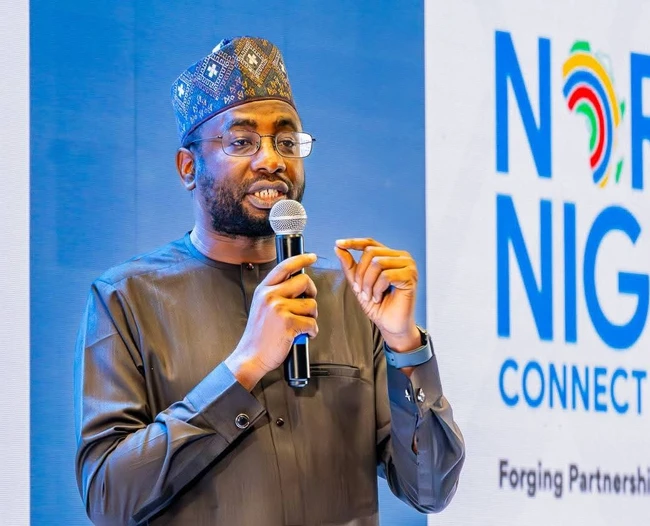Nigeria needs more that technology to achieve her digital ambition, it needs strong, forward-looking policies that encourage innovation while safeguarding consumers, says the Director General of the National Information Technology Development Agency (NITDA), Kashifu Inuwa.
According to him, Nigeria’s digital ambition transcends the physical construction of data centers or the laying of fiber-optic cables, it is about designing and building a new societal fabric, a new economic operating system for Nigeria founded on inclusivity, resilience, security, and digital prosperity.
Inuwa who spoke at the NORDIC Nigeria Connect 2025 held in Lagos on the theme “Nigeria’s Digital Infrastructure Ambition and Path to Sustainability,” stated that the nation’s digital vision rests on two key components: the Shared Digital Backbone and the Operational Backbone.
He said that the Shared Digital Backbone represents the hardware layer-including terrestrial fiber optics, subsea cables, green data centers, and sovereign cloud services that secure Nigeria’s data and ensure digital sovereignty.
“The Operational Backbone, which forms the software layer, refers to Nigeria’s Digital Public Infrastructure (DPI)-a suite of interoperable systems that include digital identity, payment frameworks, and secure data exchange platforms. Together, they create a unified national digital ecosystem that empowers startups to develop homegrown solutions tailored to Nigeria’s unique socio-economic context”, he stated.
Citing the recent global cloud outage experienced by Amazon Web Services (AWS), which disrupted digital operations across several African nations, he stressed the importance of digital independence.
“This incident reminds us that relying solely on foreign cloud regions does not ensure business continuity or digital independence. We must build the capacity for digital self-determination,” he said.
Inuwa noted that achieving Nigeria’s digital ambition requires more than technology, it demands strong, forward-looking policies that encourage innovation while safeguarding consumers.
Outlining Nigeria’s path to sustainability, Inuwa identified three foundational pillars: Policy, People, and Partnerships.
Under the Policy Pillar, he explained that Nigeria is building a predictable, pro-innovation regulatory environment that fosters growth and investor confidence. Through the Nigeria Startup Act and Data Protection Act, the government has laid the groundwork for a stable digital market that safeguards rights while encouraging innovation.
On the People Pillar, he noted that no infrastructure can thrive without the human talent to sustain it. Through the National Digital Literacy Framework and the Three Million Technical Talent (3MTT) Programme, Nigeria is building a self-sustaining talent engine that empowers citizens to design, innovate, and drive the country’s digital future.
Under the Partnership Pillar, Inuwa reiterated the need for strategic collaboration with global partners. He highlighted that Nigeria is moving from ad-hoc relationships to structured partnerships that promote joint ventures, attract investment, and co-develop technologies like Artificial Intelligence (AI).
He revealed several major projects that are transforming this ambition into action. On infrastructure, the Project BRIDGE initiative is expanding Nigeria’s terrestrial fibre network to 125,000 kilometres through public-private partnerships, while the National Sovereign Cloud Initiative is fostering a competitive data storage ecosystem within Nigerian jurisdiction.
On the software side, the Nigeria Stack is driving nationwide digital identity, payments, and data exchange systems, while the OneGOV platform will unify all government services under a single digital window.
He also cited ongoing efforts at the National Centre for Artificial Intelligence and Robotics (NCAIR), which is leading applied AI innovation through initiatives like the AI Collective and N-ATLAS, Nigeria’s indigenous large language model project.
He further called for greater collaboration within Nigeria’s digital ecosystem and stronger international partnerships, and particularly identified the Nordic region as a key ally in Nigeria’s digital journey, citing opportunities to leverage Nordic expertise in technology and innovation while offering Nigeria’s vast talent pool and creative potential in return.
Inuwa reaffirmed that Nigeria’s digital transformation rests on three foundational pillars: robust digital infrastructure, human capital development, and strategic partnerships.
“With clear vision, deliberate strategy, and inclusive policy frameworks, we are confident that Nigeria will not only achieve digital sustainability-we will lead Africa’s digital transformation,” he added.





